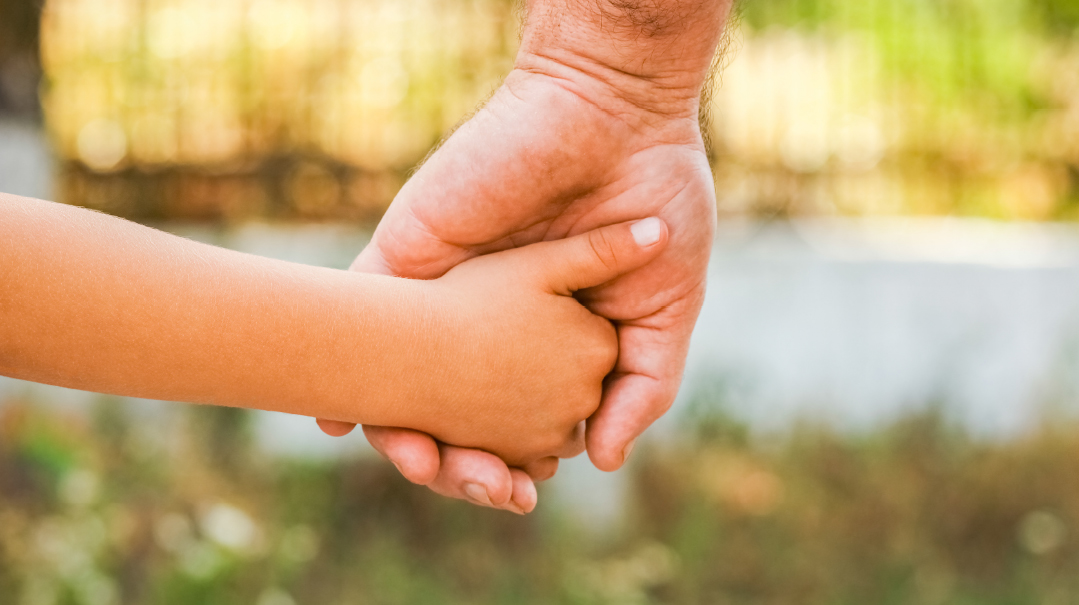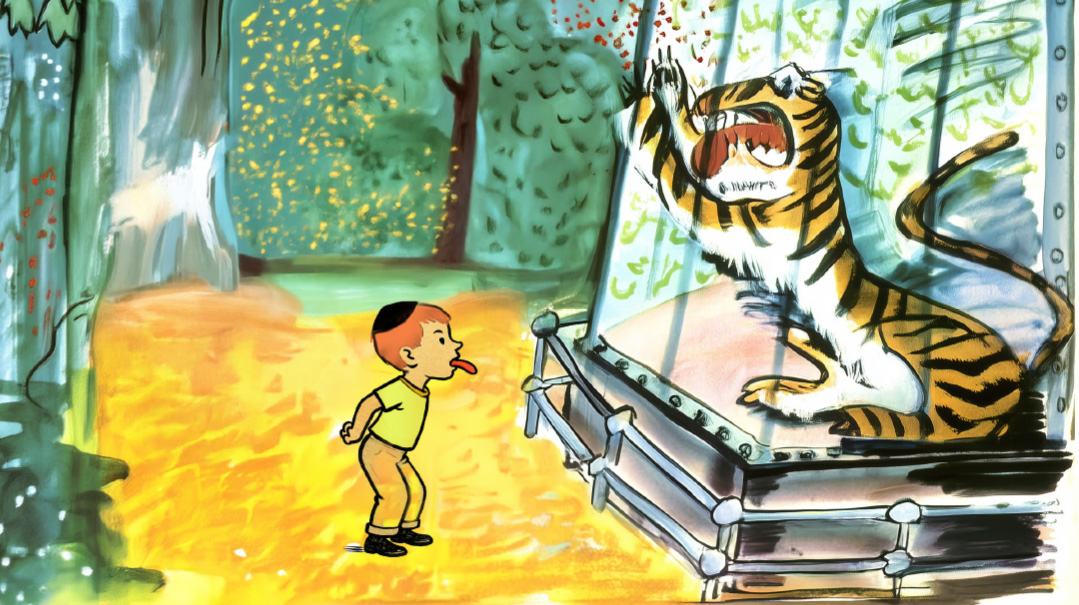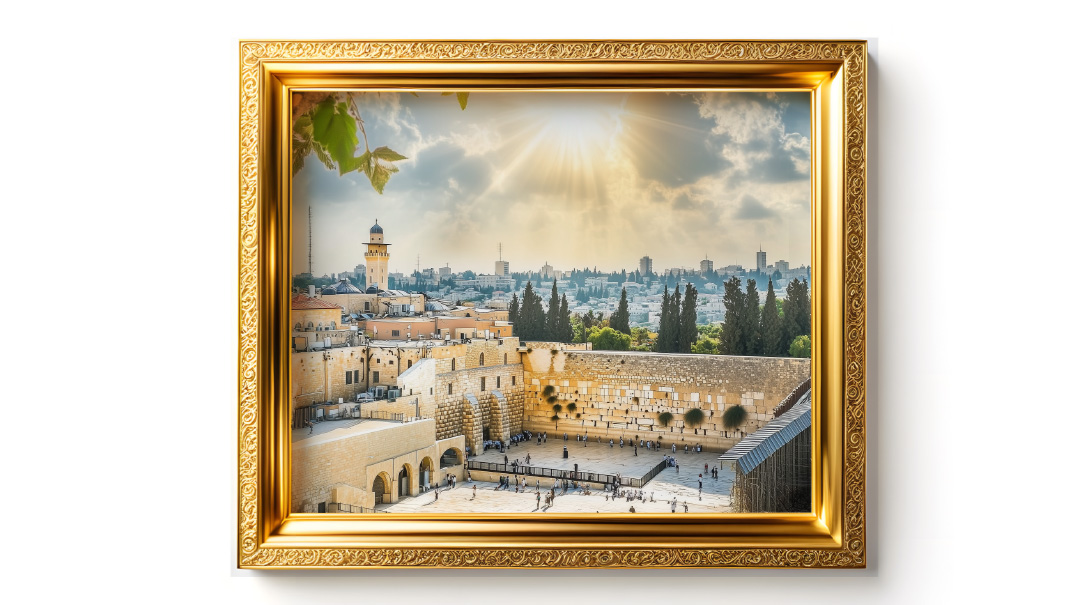Hold My Hand
| July 13, 2021The best part of shul was walking home hand in hand with my father

Decades have flitted by, but I can still smell the distinctive scent of the first shul I knew as a girl.
Was it the variety of well-used siddurim and seforim with brittle yellowing pages bequeathed to the motley shelves by heirs who no longer opened them? Or was the worn magenta upholstery on the seats and the thick tasseled curtains covering the closed windows the source of the aroma? Maybe it was the faded velvet cloth on the amud or the matching royal blue paroches, donated in memory of someone’s beloved parents; was that it?
I always sat close to the tall mechitzah, behind the front row of cloyingly sweet-smelling old ladies, longing to see, not just hear, what was going on. There were no young women in shul. Just the three of us kids: the chazzan’s twin daughters and me, the rav’s daughter. The old ladies — perhaps no older than I am today — seemed ancient as they chatted in Yiddish, which we only sort of understood.
We had difficulty following the Shabbos davening, but embarrassed to intrude on these older women’s prayers, we managed as well as we could. At nine years old, I was the oldest of our trio, and I’d try to catch the echoes of familiar words and locate them in our siddurim.
The best part of shul was when we left, and I walked home with my father. I walked close to him as he held my hand. We were usually accompanied by other congregants. Sometimes they engaged in heated discussions in Yiddish about halachah or the parshah, and I couldn’t follow. I’d busy myself trying not to step on any ants or on the cracks in the sidewalk. My father would then squeeze my hand hard to convey he hadn’t forgotten about me, and I’d feel secure and loved.
When the last congregant turned toward his house, we were finally alone, just my father and I. Sometimes he remained absorbed in his own thoughts, and we’d walk together silently as I clung to his hand. But there were other times where he would breathe life into sections of the Shabbos davening whose meaning I didn’t always understand. I could read the words of course — I was already in fourth grade! — but I often didn’t know what I was saying.
I can still hear his words today. “Listen carefully, Zeldaleh, and pay attention to the first letters of these words in the Shemoneh Esreh of Mussaf. Tikanta Shabbos ratzisa korbonoseha…”
He emphasized the first letters of each word as he recited. I didn’t respond. He repeated the words again, but I still didn’t appreciate their significance. Patiently, he recited just the first letters:
“Tof, shin, reish, kuf. You see now? Should I repeat? Noch a mohl? Tof, shin, reish, kuf!”
The letters crept into my brain and retrieved a fleeting picture of the poster on the wall in the front of my classroom, with those last letters of the alef-beis, running backwards toward the first of the 22 Hebrew letters, alef.
I was awed. I still didn’t know what all the words meant. But I realized that the clever technique skillfully used by the author of this beautiful tefillah had made it easy to memorize.
I wanted to continue our learned conversation, and to keep my father’s attention, so I ventured a complaint about the davening. I grumbled about how I could never manage to finish that difficult prayer with all the spices at the end of davening, Pitum HaKetores, and how everyone would be starting Aleinu before I was halfway through.
“They rush through it, and I can hardly even pronounce some of those words. The only one I know is cinnamon!”
“Ah, mein kind, this is a description from the Gemara,” Tatteh patiently explained. “This was the incense offering that was brought in the Beis Hamikdash. The ingredients and their amounts are precise, and if G-d forbid, a mistake would be made, the person would be chayav misah. So it’s good to say it exactly as it’s written.”
That really scared me. The death penalty! I stomped my foot. “So I’m just not going to say it at all then!”
“Zeldaleh,” Tatteh smiled as he squeezed my hand, “you aren’t required to say it if you feel that you can’t. Just continue on to Aleinu. You know that well from the weekday davening, yes?”
For well over a year now I’ve been saying Pitum HaKetores, a segulah to ward off illness and plague, every single day. And I don’t miss a single word. My father, may his holy soul rest in Gan Eden, would be proud. And for almost a whole year, I was in galus from all shuls, old and new.
But now, finally, I can savor again the fragrance of old seforim and worn upholstery from behind the mechitzah. There are more empty seats than when we left a year ago. Those of us who have returned are glad to be back. Glad, but heavyhearted.
We ache with the loss of those who haven’t come back. And we’re bewildered. Is this what we prayed for so fervently from our balconies and rooftops? Masked but not muted, we stormed the Heavens with our pleas and took upon ourselves extra good deeds, as whispers of imminent redemption consoled our confused souls.
We’re grateful You have led us out of the chaos and back into our houses of prayer. But we want more. Has the time not yet arrived when You will finally usher us into the beis tefillah l’chol ha’amim?
Images blur before my eyes. The vintage picture of the shul of my youth, a world that no longer is, the minyanim on porches, where we screamed out to Heaven while fearing for our lives, and the shul I daven in today, with too many empty seats.
Please Father, take us by the hand and lead us home.
(Originally featured in Family First, Issue 751)
Oops! We could not locate your form.







